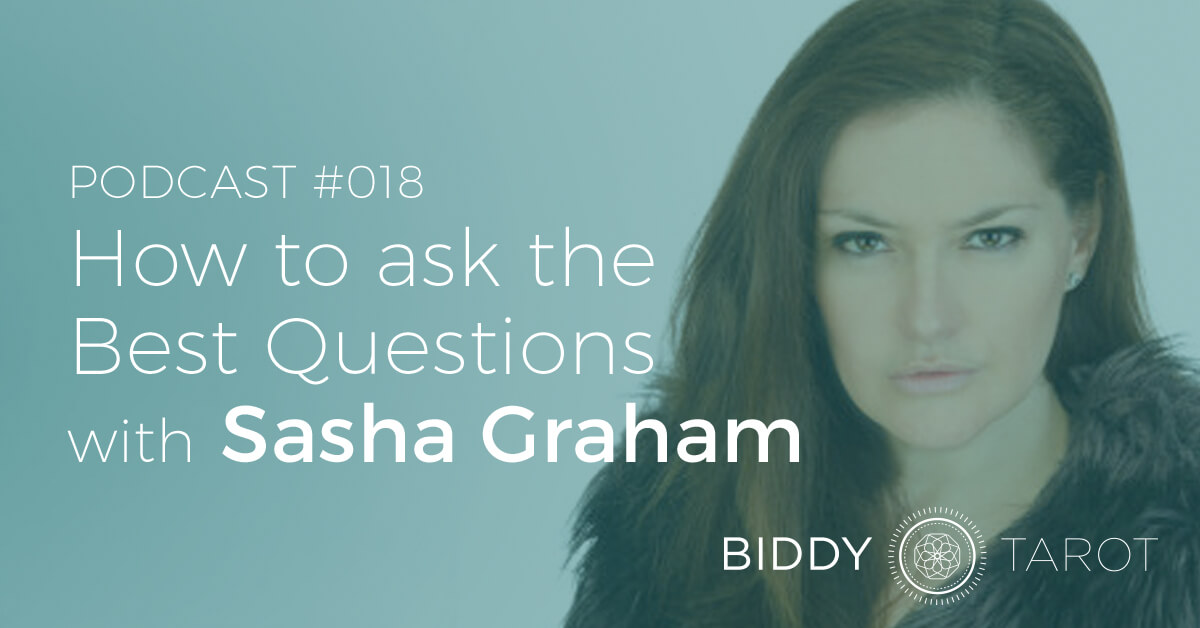
Asking the right questions is essential to making your Tarot readings ‘pop'.
Ask a vague question, and you'll get a vague answer. But ask a ‘power' question, and you'll get a ‘power' answer.
In this podcast, I invite Tarot diva, Sasha Graham, to walk us through how to create those ‘power' questions to get the most out of a Tarot reading.
Sasha shares:
- How she uses Tarot on a daily basis to help elevate her thinking and create a better life for herself
- Why the questions you ask will make or break a Tarot reading
- How to manifest your wildest dreams with Tarot as a guide
- Why posing the right questions will support your goal manifestations
- The best ‘power' questions to ask the Tarot
Let's get into it!
[Tweet “Here's how to ask powerful questions of the #Tarot with @sashagraham @biddytarot”]Additional Resources
- Sasha Graham's website
- Sasha on YouTube
- Sasha's new book, 365 Tarot Spells – Creating the Magic in Each Day
- How to Ask the Right Questions – post at She Knows
Podcast Transcript
Brigit: You’re listening to the Biddy Tarot Podcast, and this is Episode 18: How to Ask the Best Questions.
Voice-over
Intro: Welcome to the Biddy Tarot podcast, where you will learn how to connect more deeply with your intuition and live an empowered and enlightened life with the Tarot cards as your guide.
Listen as Brigit and her guests share their very best tips and strategies to help you read Tarot with confidence.
And now, here is your host Brigit Esselmont.
Introduction
Brigit: Hello and welcome back to the Biddy Tarot Podcast.
I am so happy that you have come back.
We are getting such good feedback around the Biddy Tarot Podcast, with some awesome reviews coming in. So I am so grateful to you all for listening, for being part of it, and for also sharing your really positive feedback.
And it’s my absolute honour and pleasure to be in your earbuds, and in your ears, talking about Tarot – so a big, big thank you, and lots and lots of gratitude going out to you.
Today we’re talking about questions, and how to ask the best questions of the Tarot.
Getting questions right is so crucially important because it means that we’re getting the best information out of the Tarot cards. Because if you approach the Tarot with a vague question, or a questions that’s a bit out of sync with what you really want, then your reading is not going to give you the quality that you really desire.
But when we align our questions in Tarot with our desires, and what it is that we really want to manifest in life, then we get more out of the Tarot reading.
Now I’ve already shared with you a little bit about how I see powerful questions happening in a previous podcast episode, so this time I wanted to invite a very special guest to share her ideas around how to ask the very best questions of the Tarot.
And my special guest is a book author, a party event organiser, a Tarot teacher, and probably one of the most hippest, modern people I know in the Tarot space.
She is none other than Sasha Graham.
Now Sasha has written books such as The Tarot Diva and 365 Days of Tarot Spreads; plus she has a new book coming out around Tarot and magic, in May – which I can’t wait to see.
She’s also taught Tarot at the Tarot School, and just has a really beautiful, down-to-earth, and grounded way of connecting with Tarot and working with her clients.
So without further ado, I want to welcome on, Sasha.
So welcome, Sasha, it is so good to have you here on the Biddy Tarot Podcast.
How are you going?
Sasha Graham: Oh, I’m good.
Thank you so much for having me.
Brigit: It’s an absolute pleasure.
You are one of the most modern, hip people in Tarot that I know. And having seen one of your earlier books, Tarot Diva, I was like, “Oh! Yes! This is it!”
So I’m super-thrilled to have you on our podcast today.
Sasha Graham: Thanks.
Brigit: Tell me a little bit – how did you get into Tarot in the first place?
How did you find Tarot, or how did Tarot find you?
Sasha Graham: Tarot found me.
I’m a Halloween baby. I was born on Halloween so I always had this idea that marked me as somehow being special and having special powers – being a witch.
And that included – the first way I sort of experienced that was through the Tarot. I felt it was my birth right to read the cards. So I was about 12 years old when I got my first deck, and I opened it up, and I was all excited and ready to read them, and when I pulled them out I discovered I couldn’t read them!
I was totally befuddled by the images and meanings, and the little white book. And it was a very humbling experience.
And I think part of the reason I wrote Tarot Diva was once I understood how to read the cards, I wanted to show people an easy, simple way they can read the cards – how it’s not as overwhelming and confusing as it looks.
So that was it.
I was self-taught, until I went professional. And then once I started reading professionally, I went to the Tarot School, here in Manhattan.
Brigit: How has Tarot played a role in your life since those early day, up until now?
Sasha Graham: Oh my God, honestly, I sit here, I can’t imagine my life without the Tarot.
At first it was just fun, and fascinating, and then it became a way for me to help figure my friend’s problems out; and help figure myself out.
And then it became a profession.
And in the beginning it was just reading. All I did was read the cards for people here in the city, and then I began taking it into places I never expected – that I would be writing books about it; creating events around it.
I didn’t realise there was an entire Tarot community out there.
And now, ultimately, I really look at the cards that they’re constant kind of setting the bar for me personally. I look at the cards as sort of a reflection of your Psyche.
So I’m always using them to help; to help provoke me to better places – if that makes sense?
I can’t imagine – it’s funny you should even ask that question, because I had just flipped a card, I think this morning, and I was thinking: My God, what would my life have been without Tarot, because it’s really where I challenge myself every morning. I pull a card a day – at least a card a day – for over 10 years now, so I can’t imagine my life without it.
Brigit: The question that’s popping into my mind is: How do you maintain a healthy level of detachment with the Tarot?
What I mean by this is: I think sometimes we can do daily card draws, and if go down one path we can end up forming almost like a dependency on the cards – “I can’t make this decision, until I’ve consulted the cards,” or, “I can’t possibly move forward in my day until I’ve look at Tarot.”
But, clearly, you’re using it in a more constructive way. I’m just curious: How do you maintain that healthy relationship with Tarot?
Sasha Graham: I think, if I understand your question correctly, I don’t look at the cards as giving me an answer.
I won’t say: “What should I make for dinner?” flip a card and go, “Ah, Queen of Pentacles, that’s chicken.”
When I flip a card when I ask a question, what I’m looking at is that card reflecting a part of myself. So if I’m flipping the Empress in regards to a question I have, she’s begging me to take a look at how creative I can be about the situation. That’s just a simple example. And the idea of myself and creativity, that’s kind of infinite, right?
So rather than being sort of a quick answer, something that would bring me into a dead-end, it kind of provokes me to go even further and think about ways in which I could be creative that I haven’t thought of.
And then also, because I write a lot about the Tarot, and because I kind of put it – I look at all of the events in my life and the world around me, through that lens, I’m constantly trying to push it forward and see how I can understand the cards and myself in a different way.
And because Tarot is repetitive, and the nature of life is repetitive, the more I ask, hopefully the deeper I go, or the further out I expand like a balloon. So Tarot to me is something that feels very pliable, and almost like clay.
Which isn’t to say I don’t get stuck sometimes – like with the Nine of Cups. Sometimes I get stuck with him: Your wish will come true. I was working with him the other day, so that’s so funny. I think it’s a pliable art, and so I keep pushing myself forward with it.
Brigit: Okay, so let’s switch gears a little bit. And I’d love to hear more about how you form questions for the Tarot. And how do you ask the right questions of the Tarot?
Sasha: I think that the formation of a really good question is so super essential, because it’s like the first thing that you ask.
Whether you are reading the cards for yourself, or whether you’re reading for a client, it’s always that first thing, like: What do I want? What is it that……?
And I think that often times, especially if you’re someone who works with your friends, or if you work with clients and the cards – and I would assume that a lot of your listeners do because, of course, reading for others is one of the best ways to get to know Tarot.
Often times the formation of a question can be so incredibly helpful because a lot of times your friends or your clients don’t really know what it is that they want. Or they have this idea in their head of something they want – maybe it has to do with a romantic relationship, or with their Life Path – but because it’s been in their head, because they maybe haven’t articulated it, then coming up with the question can become half the reading. And sometimes just helping the person realise, or articulate, what it is that they actually want, becomes really super helpful.
And that’s happened for me a lot with my clients in the past.
But I think that forming really good questions is so essential, whether you use Tarot or not. And I don’t think you necessarily have to use cards when it comes to asking good questions.
Of course we’re lucky because we have the Tarot to ask.
I think it’s an incredible human facility that we have the ability to dream and to imagine something, so when you have a vision in your mind, a desire, or something that you want, after you experience that, the first thing that you’ll ask yourself is: How do I make that happen?
How do I do that? How do I get that? I want that! How can I make that mine?
So once you know what it is that you want, I think the formulation of a good question will trick your mind into finding the answer. So when it comes to achieving a goal or manifesting a desire, I think that the power really does lay in the question, and not in the answer.
Brigit: I’m just thinking: Yes! Yes! Yes!
Because I think landing on that right question is almost a process – a healing process within itself, right?
Sasha: Yeah.
Brigit: Because it’s the nature of asking that particular question that will seed the mind to start thinking about what the answer would be.
Sasha: Exactly. Exactly.
And this is the interesting thing about what happens with questioning that our minds are created so that once we answer that question, we leap-frog onto the next one, because it’s our human nature. It’s like you sit around and think: What am I going to have for lunch? And the minute you decide and have that, you’re onto the next thing, right?
So if you’re asking a really, really good question about: How can I set myself up for success? Once you do that you’re leap-frogged onto the next. Okay, so how do I spend the money that I’ve now created with my good success?
So if your brain is given good questions, you’re going to be moving forward in a really proactive, smart way that moves you quicker in the direction that you want to go.
And that’s why I think that we can use Tarot to help us come with good questions so we’re always sort of moving further faster.
Brigit: So how can we help either ourselves or our clients get to that point that we are asking an appropriate, or a constructive, kind of question?
How can we get to that place?
Sasha: Well I think it’s always best for us to take a look at what you don’t want to do; or questions that you don’t want to ask.
So what’s an example of a negative, or maybe even a toxic question? And I think those questions tend to begin with either why or when.
So questions like:
- When am I going to fall in love?
- Why am I such an idiot?
- Why am I so unlucky?
- Why is this happening to me?
- Why am I eating this fourth slice of pizza?
I think that these questions aren’t only poorly constructed, but I think they’re just destructive, because they cave in on your brain.
When you ask – whether you ask a Tarot card, or anyone “why” or “when” it doesn’t give your brain any room to explore or discover a satisfying answer that sets you on a new course; because “why” or “when” – even if you find out “this is why you’re so unlucky” – what are you going to do about that?
And if you ask, “When am I going to fall in love?” “Friday, September 9th.” What are you going to do? Just sit home and wait until that happens?It doesn’t give you anything to do.
But a good question begins with “what” or “how”.
A good question acknowledges the personal power that you have over your future; and then they put your brain in the driver’s seat, so they give your brain something it can do.
So you could say, instead of, “When am I going to fall in love?” you could ask, “What can I do to cultivate an amazing, romantic relationship? What can I do?”
So immediately your brain is thinking:
- What can I do?
- What should I do?
- What can I do differently?
- How can I attack this issue in a different way?
- How can I have more fun in my life? What fulfils me?
And these questions, the “how” and the “what’” questions, you could spend your life really enjoying yourself, find the answer to: What fulfils me?
What am I passionate about?
What is it I’m here to do?
These are questions that, they’ll trick your brain into proactivity. And when you’re asking them of Tarot, you’re going to get back a very specific answer, that then you can go and make magic with.
Brigit: And I think it’s even going beyond just choosing a question that’s appropriate for a Tarot reading.
It’s, as you say, to trick your brain, and it’s almost to trigger that next step and that action. And, again, just that process of asking the right question pushes you forward a step, and then the Tarot adds the next step, in terms of giving you even deeper insight.
It’s lovely.
Sasha: And it’s good.
I think it really works. I love the idea of creating really good power questions for yourself.
A power question, in my opinion, is something that tackles a really big issue, or big goal, or big desire that you have. And I think if you ask it every single day, I think it – a lot of people will pull a Tarot card every day – so if you ask….
If you’re really stumped on something – and I know this because it happened for me before I became a professional reader I spent about a year knowing that I was going to make a career change, and I didn’t know what I was going to do. And I asked every day. I didn’t ask the Tarot, I kind of just looked up every morning and went, “What am I supposed to do? What’s my next step?”
And one day it hit me. It really hit me after a good six months, 12 months, of asking. But it was the right answer.
And I think that since people are usually using their cards on a daily basis, it’s worth it to construct a really powerful question that you’ll find the answer to – with the power to change your life or, at the very least, improve it.
Brigit: So with a daily power question, is there something general that you would recommend?
Or is it that each individual should come up with what their one thing is that they most need to know?
Sasha: I think that there are three things that anyone can do when you’re constructing a really good power question, or just a regular question.
And this is something you might want to keep in mind when you’re – if any of your listeners are working with clients – and it can be something that can really be beneficial to the people who come to you. So the three things that you would do to construct a power question are:
1. Acknowledge the role that you play in your future.
It’s not 1492 – we all know that we have a great deal of effect over our future. Our destinies are not written in the stars, so inside of your question, acknowledge how much power you have in your life. Because we all do. We’re all so powerful.
2. State your desired outcome.
And sometimes you won’t know necessarily what that is. Some people are very, very specific: “I want to make two million dollars a year,” or, “I want to move to California,” or, “I want to be married with a baby within three years’ time,” – and if you know what it is, that’s great! State it. Put it inside your question.
But if you don’t know what you’re desired outcome is, state the qualities. A lot of people come to me because they’re unhappy with their current job but they don’t know what they’re supposed to do – what their ultimate career path might be. And I always say, “Well what is it that you want? What are the qualities that you want?”
So start to describe, even if you don’t know specifically what your desired outcome is, describe how it feels, because we all know what we want to be feeling.
3. Construct Yours
Put those two together, acknowledging the role you play in your future, stating what you want, and then create the questions. And then, in my opinion, just ask that question every single day until you get your answer. And I promise you, you will – if you are diligent and ask it every day, you’ll get your answer. And if you ask it with the Tarot, I think you’ll get it a lot faster because the images in the cards will really point you in the right direction.
Brigit: I love how it’s focussed on: What is it that you truly desire? What do you want?
Because I think that’s showing, in my opinion, it’s showing Tarot in it’s most powerful use, which is to manifest your goals and dreams…..
Sasha: Yes.
Brigit: …..versus to tell you what’s going to happen, because when you use it for more like prediction and, “This will happen,” then it’s taking your power away. But when we look at it from the perspective of, “How do you manifest what you really want?” then that’s the exciting part for me. It must be for you too.
Sasha: Exactly. Exactly. Exactly.
And you know it’s a funny thing too because – I don’t read predictively, and I don’t – even if – what do you do? – so the future is always going to sort of be out there – the best thing it can do, I think, when you’re predicting your future with the cards is kind of maybe make you relax a little bit.
The FREE 5-Day
Tarot Reading Challenge
Become a More Confident,
Intuitive Tarot Reader
Join Brigit Esselmont
for an EXCLUSIVE Live Event
April 28th - May 2nd
I think being in creation mode always, as a human being, is so much more powerful, and more exciting. Because at that point, if you’re just sitting back and waiting for some predicted outcome to happen, you might as well be like watching The Kardashians on TV or something – which isn’t to say that’s not super fun, but you know what I mean?
You have to be active in your life.
Brigit: Yeah.
I mean that’s certainly where I like to play. I like to be thinking: What is it that I want, and what can I do right now to go and make that happen?Versus: Oh, this is going to happen. And there’s just like blah.
It’s so passive, isn’t it?
I much prefer an active approach to life, and I think certainly many people do. So using the Tarot in that way is an awesome use of this tool.
Sasha: Yeah.
Brigit: I’m curious – whenever we talk about questions in Tarot, the topic of re-phrasing people’s questions often comes up.
So I’m curious to know, what’s your approach?
Let’s say you had a client sitting in front of you, and your client says, “Right, I want a husband. When am I getting a husband? When am I going to fall pregnant? And what’s the first letter of my husband’s name?”
So I’ve set that scenario up for you, what do you do now?
Sasha: Okay, so with my reading clients I always have a pre-interview with them before I actually do a reading, to make sure that we are a perfect fit.
And I explain to them how I read, and they tell me what it is they’re looking for.
I don’t do predictive readings, so I would never be put in that situation where someone would be like, “Tell me my husband – the letter of his first name.”
Just because at that point, if somebody wanted that kind of specific predictive information, I would say, “I’m not the reader for you. But there are plenty of other readers out there who would probably be more than happy to give that information to you.”
But often times, or if you’re at a party – and I’ve certainly been at parties where I can’t interview the people that are in line for five minute readings,at a Halloween party – when somebody sits down, I’ll tell them, “I can’t answer a question like that,” or, “It’s not within my ethics to answer a question like that.”
And most of the time I have to re-phrase when it comes down to Mother-Child questions.
You will get a client who has maybe a daughter who’s in her first year of College, and she’ll be, “Tell me what’s going on! I want to know what my daughter’s up to.”
And I feel like when you’re reading Tarot it is unethical to peer into someone’s life, so I will always help them re-phrase their question and say, “You know this isn’t appropriate for the way that I read, but why don’t we pull some cards and see how you can best support your daughter right now? How can you be the best parent, the best coach? How can you best show up for this person in your life that you love, who you’d like information on? What can you do to be their best sort of power support, or source of power and love?”
And so I will always re-frame the question and put the onus back on the person who’s come to the reading, rather than prying into somebody else’s life – if that makes sense?
Brigit: Absolutely.
Let me throw you another scenario – I’m curious again to see how you might respond. I’m glad we touched on the third parties because that’s a topic that often comes up in discussion too.
But let’s say someone walks in and they say, “Right, my question is, why am I so depressed?”
What might you do in that situation?
Sasha: That’s a great question.
“Why am I so depressed?”
Well what I would start doing – I would start to psychoanalyse and talk to them, and start asking them questions– before I even flipped any cards, I would find out as much information as I could.
And I would say, “Why do you feel like you’re depressed? What is your greatest source of angst – X, Y, Z?”
And so I would start feeling them out in that way before I pulled cards.
If somebody came to me and said they were incredibly depressed then I would – and they didn’t want to say anything else to me, although I don’t think that’s ever been the case, I would say, “Let’s pull some cards….”
No, I would probably do a Celtic Cross spread, to get sort of a holistic idea of where they were in general, because the Celtic Cross gives you a little taste of everything. It’s like a snapshot of a life. And then I would most definitely pull a card to give them a focus. I would pull a Focus Card.
Because here’s the thing – I think that most people walk out of readings remembering maybe only two or three things you say, even if it is a 60 minute reading. There’s just too much information coming at you. So I think people tend to walk away with just a few things that they hold onto. So, knowing that, I always try and give my clients something they can walk away with.
And it’s so easy now because somebody can pull up a card and they can use it as a screen saver, or put it on their phone – so especially if somebody was depressed and were looking for a source of light, I would pull a card and say, “This is what you can focus on.”
Because you can find something wonderful to focus on in any card, and then hopefully it would help maybe give them a direction to move towards healing.
Brigit: Yeah, wonderful.
And I’m going to throw one more last scenario at you – only because these are questions that I know come up a lot.
So let’s say if someone sat down with you and they just shared all their life story, or all the details about a particular issue or what-have-you, and you’re sitting there, you’re listening, and you’re like: Where’s the question?
Where is the question?
And all you are getting is like the problem. What would you do in that situation? How do you start to get to a place where you’ve got something to work with?
Sasha: You mean when somebody is just sort of like, “Blah, blah, blah, blah, blah,” and they’re just like telling you about everything and the kitchen sink?
Brigit: Yeah, and you’re like, “What do you want to know?”
Sasha: Well, I always take my cues from the client, and for some people, they do just want to talk about whatever it is that they want to talk about. So I would wait until I think they felt they had expressed themselves in a way that made sense, as long as time wasn’t running out.
And I would subtly say, “Well, what’s your challenge? What is your issue? What do you want to look like? Or should we just start pulling some cards and see what they say?”
I think if you’re ever in a crux and you don’t know what to say, you can lean on those cards. They are like your best crutch ever. So you’ll just say, “Let’s pull some cards. Let’s see what the cards say.”
Even if a person hasn’t asked you a question, at least you can feel like you’ve given them something. But, you know, sometimes people just want to talk, so you have to take your cue from them.
And if somebody came in for an hour reading, and they talked for 55 minutes, I still just pull a card for them to walk away with, so they would have something to walk out the door with.
Brigit: So what I’m noticing in your approach is not necessarily being so rigid that you insist you must have a question, and it must be the perfectly worded question, but more about being quite organic in that process, and allowing the dynamics to eventually lead you to that power question.
And it doesn’t have to happen straight away, right?
Sasha: And you know sometimes – and this is interesting – and since you were giving me scenarios, I’m going to put a scenario out there which always kind of floors me when it happens.
And I think it’s really interesting when people ask a reader something that’s kind of like horrible. Like I had a man at a party once look at me square in the face – he was gorgeous too – and he was like, “Can I get away with cheating on my wife?”
Brigit: Ooh, yeah.
Sasha: And I was like, “Wow.”
And you have to make your ethical decisions for yourself, but as a Tarot reader it’s not my job to judge someone. And so I try not to make judgement calls.
You can get into some interesting grey areas sometimes – there can be legal grey areas; there can be romantic and ethical things. And in those cases, depending on what it is, I let the cards speak for themselves, and I try and step aside as much as I can anyway, because as a reader you don’t always necessarily know the full story anyway.
But I think that’s interesting when unethical questions get brought up in surprising ways.
Brigit: And in saying that it’s so important to sort of leave your judgements at the door, and your opinions at the door, because, like you said, you don’t know what the situation is.
Like in that situation, he may already know that maybe his wife is cheating on him and now he’s trying to work out whether it’s payback time.
Sasha: Right.
I don’t think that was the case in this particular situation. I think he was a right bastard, to be honest with you. But it’s not – that’s not why – it’s not my job to judge.
And I also think it’s important that we don’t put our life perspective onto our clients, because I know for myself, I’ve had readings in the past where the reader could not – I could see that their vision of life was much different than mine. And I don’t think it’s fair for us to cast our life view on another person. And I think that might belittle their experience, so I try and stay as open and abstract as possible when the situation requires it.
And I think that it is how we can become very helpful to people.
Because, like I said before, we never really do know what the whole situation is.
Brigit: And I think that’s also important for people when they’re learning to read Tarot.
Sometimes they can tend to become too rigid in: “It has to meet these certain criteria. The question must be a “what” or a “how” question. And it mustn’t be about a third party. And it must be ethical.”
And they’re doing that because that’s a safe way of approaching a question, but I think as experience grows it does become a little bit more fluid, and a bit more organic. So I think it’s been really interesting to hear how you work with questions, knowing that there’s a great way of asking questions, but also then being flexible around not forcing a client into having to ask that specific fabulous question.
That there is a bit more dynamic going around – if that makes sense?
Sasha: Definitely.
And I feel like the power question thing – it’s good for you, but the Tarot is a very, like I said before, it’s a pliable tool.
It’s very structured, but at the same time it’s also very infinite. It’s made up exactly like our bodies, right? Like our lives. Like on the outside, we’re all pretty much built the same – two arms, two legs, one head, one brain, one heart – but the way we make up all of that is extraordinary.
And the same thing applies to Tarot because Tarot applies to us. So within that infinity you get to colour it however you like. And so it becomes ever growing and every expanding – hopefully like your practice.
Brigit: And speaking of “ever expanding”, Miss Sasha, I believe you’ve been expanding in positive ways.
Sasha: Because of a huge curry I had for dinner tonight?
Brigit: I believe you’ve been writing a book over the last wee while, so I would love to hear a little bit more about that.
Sasha: I have a book coming out in May.
And it’s kind of a follow up to my last book. My last book that I published with Llewellyn was 365 Tarot Spreads. And it gave the reader a Tarot spread for every single day of the year.
It was so much fun writing this book, simply because I’ll write books for the questions that I have. And often times I would run out of questions, so it was really fun. I wanted to write a book so that at any point anyone could open it up and ask their cards something, even if they felt like they didn’t – like if they were out of questions, or they didn’t know what to ask. Or maybe could find ways to find really good questions around a topic that they hadn’t maybe thought about asking.
So right when I was finishing that book, I started thinking: Okay, what’s next?
And I thought: My God, 365 Tarot spells – a Tarot spell for every single day of the year. How phenomenal would that be?
One of my favourite books when I was really learning and delving into Tarot was Tarot Spells.
And like magic tends to be, I picked it up thinking I was going to cast a spell, I put it down learning so much about the cards, because the Tarot spells in that book were very experiential. And so I knew that at the very least, I could give the readers a way to enter at least one card every day of the year. And then hopefully manifest all this fantastic stuff around it.
So that book’s coming out in May. And it’s exactly like the title states – it’s a spell for every single day. And it also includes mediations into the cards, so you really get inside the Arcana, and you work directly with the energy of the archetype.
And, as far as the magic that it contains, you can kind of embrace it as lightly or as intensely as your practice or your soul dictates. So if you just want to light a candle and work with a card, you can do it that way; or if you want to light a candle, light incense, open sacred space, chant, have music – you can do whatever it is that’s in your comfort zone.
But hopefully it will give you a very marked, a very guided way of achieving your hopes and your desires through the Arcana.
And I can tell you writing the book changed my life. It was like writing a book of magic has a profound effect on your life.
So I’m really excited. That comes out in May.
Brigit: Wonderful.
That sounds awesome, and apart from just being uber-cool, I think it will be great because it’s, again, tapping into that manifestation energy of the Tarot that we’ve been talking about today; and the power of ritual and magic for manifesting is pretty awesome.
It sounds good!
Sasha: And I think that’s what people are doing anyway.
I think that’s what they do anyway, and this just gives you a more formalised way, I suppose to do it.
Brigit: It’s exciting.
Sasha: Yeah, and like you say, it’s Tarot at its best.
Brigit: Yeah.
Well I can’t wait to see a copy of it when it comes out.
So Sasha, thank you so much for today. It’s been fascinating to hear how you approach asking questions, not just in your personal life, but also with your clients. So a big thank you for sharing all of that knowledge today.
Sasha: My pleasure. Thank you for having me.
Brigit: It’s been my pleasure too.
So where can people find out more about you?
Sasha: They can go to my website: sashagraham.com
Or they can just Google: Sasha Tarot diva, I would come up probably pretty quickly on Google.
But definitely my website – Sasha Tarot Diva – I’m on Instagram – I’m on Facebook. I’m pretty much all over the place.
Brigit: And I’ve been seeing some really cool Tarot recipes coming out from your website.
Sasha: Yes.
Brigit: That is the coolest idea. I love it.
Sasha: Yes.
And my husband and I have shot a few of them, so you can also find me on You Tube: Sasha Graham Tarot Diva on You Tube.
I’ve got some cool Tarot recipes, so you can find me there too.
Brigit: And, just reflecting, I think that’s what I enjoy most about how you interact with the Tarot, and it’s – you make Tarot fun, and you bring it into new spaces that’s more integrated into daily life.
And I think that’s awesome, and it’s fun, and cool. So I’m really happy to see that happening.
Sasha: Thank you.
Brigit: Well it’s been a great conversation, and I really appreciate it.
And I wish you amazing success with your new book – I’m sure it will come. And no doubt you’ve probably done a few Tarot magic spells to make it all happen.
But thank you very much, and we shall speak soon.
Sasha: Sounds good.
Thank you.
Brigit: Thanks.
Outro: Okay, if you loved today’s episode, then please go onto iTunes and leave a review, and remember to subscribe to get the latest podcasts. I’d be ever so grateful if you can share your thoughts, opinions, and feedback, so that others will know if this podcast is a great fit for them as well.
Thank you so much for listening, and I can’t wait to speak to you next time.
Thanks and good-bye.

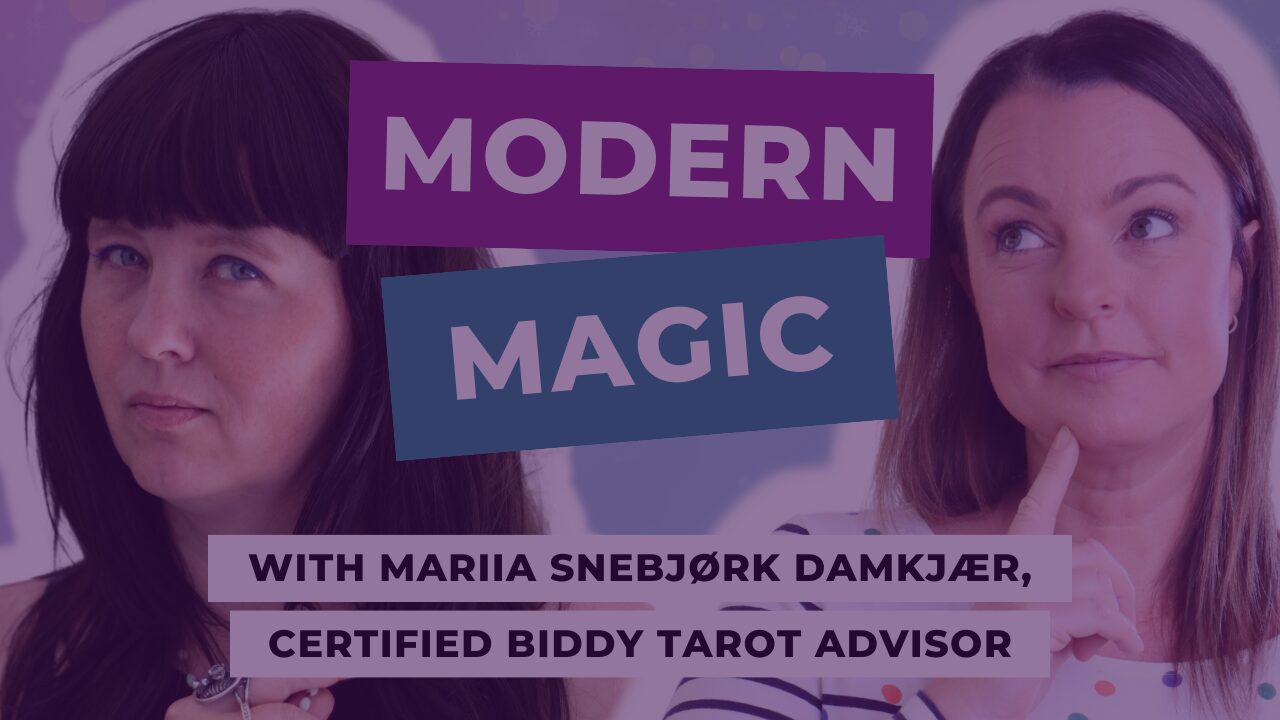
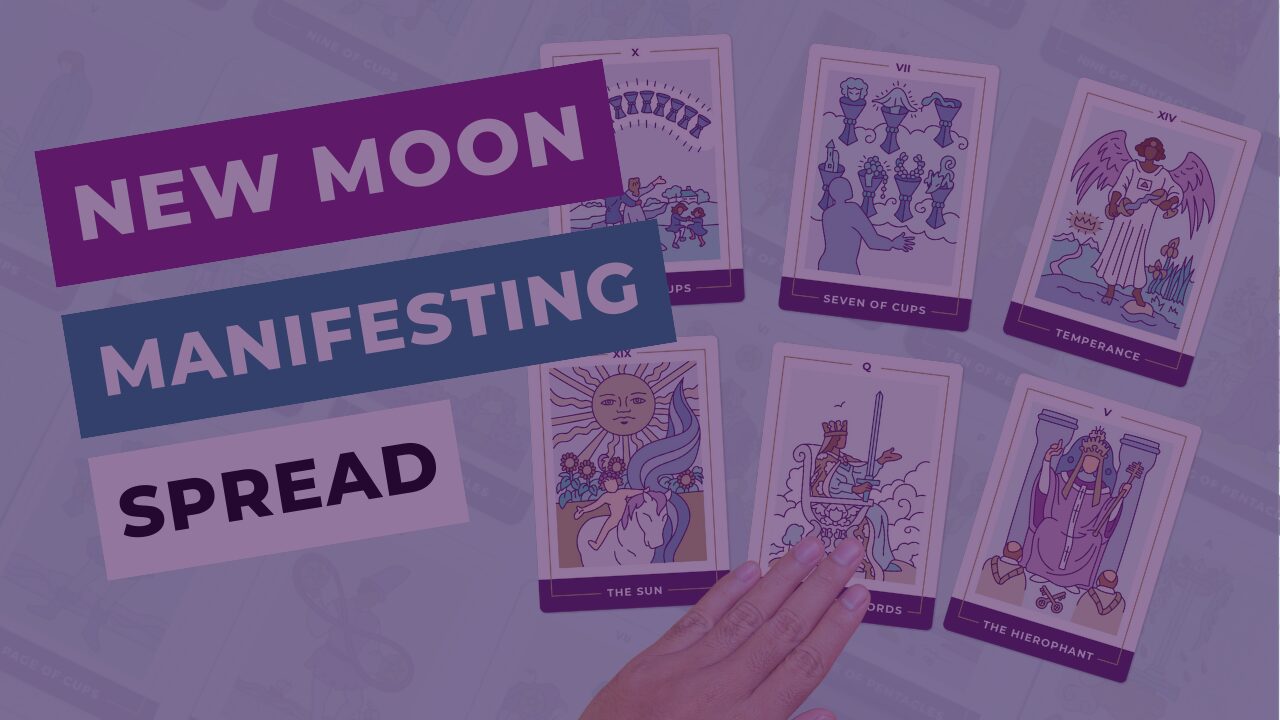
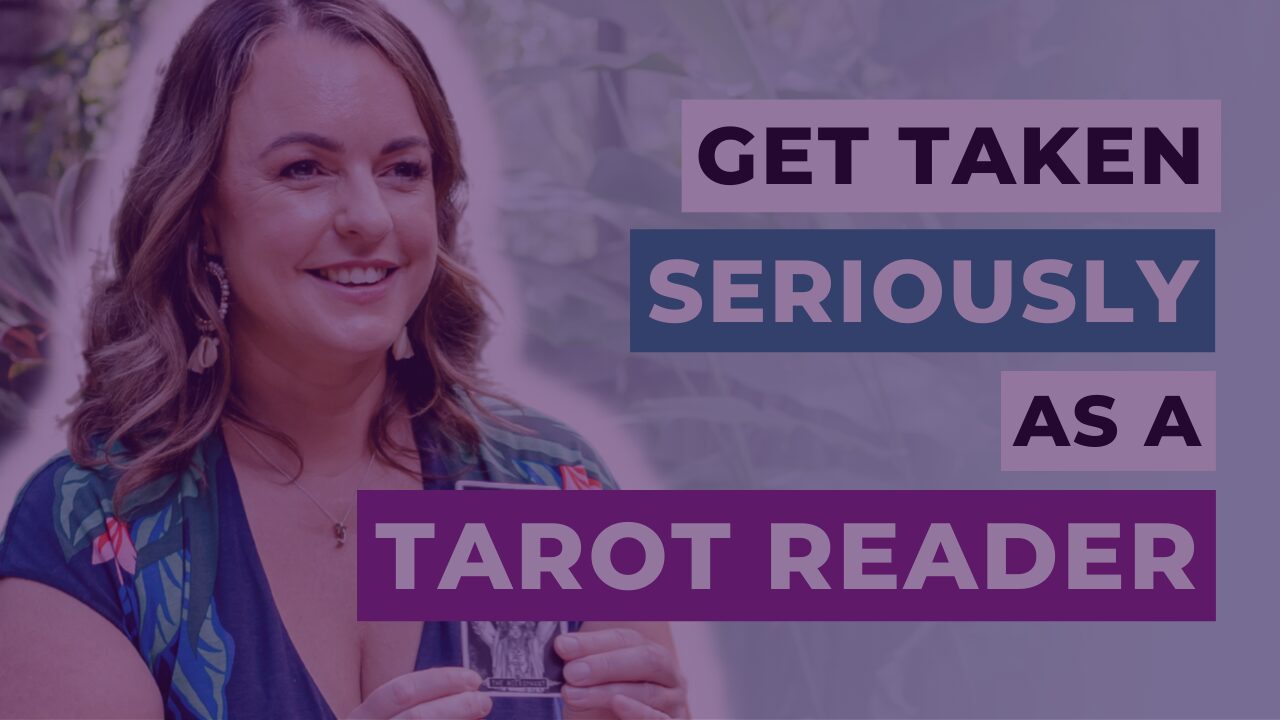
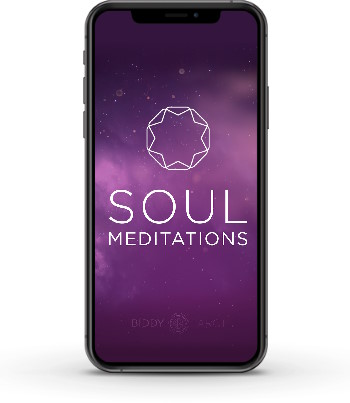 Harness the wisdom of the Major Arcana with 22 guided meditations. Here’s what you’ll get:
Harness the wisdom of the Major Arcana with 22 guided meditations. Here’s what you’ll get: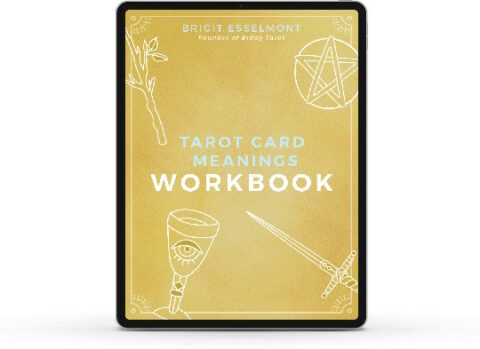 Create a deeply intuitive and personal connection to the Tarot cards with your very own Tarot Card Meanings Workbook. Here’s what you’ll find inside the workbook:
Create a deeply intuitive and personal connection to the Tarot cards with your very own Tarot Card Meanings Workbook. Here’s what you’ll find inside the workbook: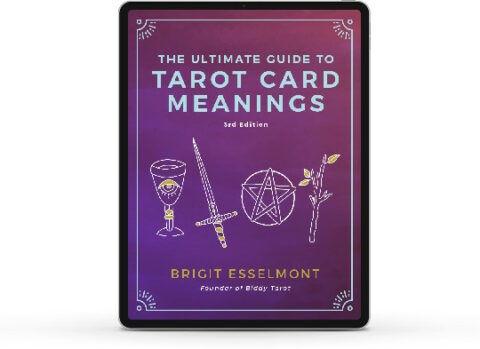 Here’s what you’ll find inside for every card in the deck:
Here’s what you’ll find inside for every card in the deck: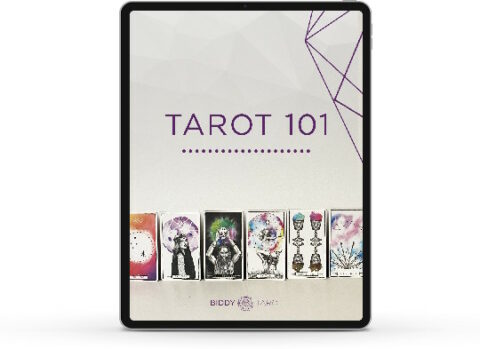 Start doing deep, accurate readings TODAY with this step-by-step accelerated program for beginners.
Start doing deep, accurate readings TODAY with this step-by-step accelerated program for beginners.